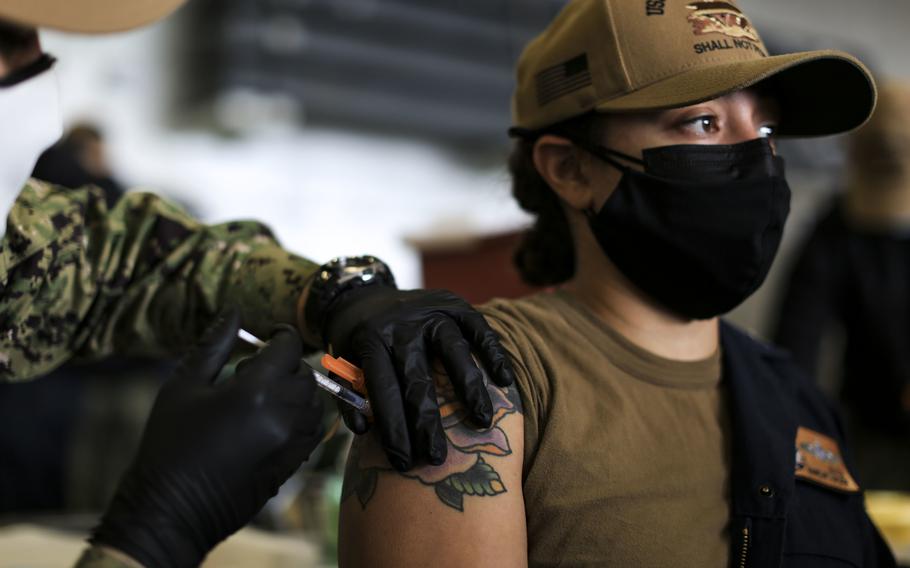
Machinist’s Mate 1st Class Kayla Matos receives a coronavirus booster shot during a vaccine event in the hangar bay aboard USS Abraham Lincoln on Dec. 28, 2021, in San Diego. (Lake Fultz, U.S. Navy/TNS)
Stars and Stripes is making stories on the coronavirus pandemic available free of charge. See more stories here. Sign up for our daily coronavirus newsletter here. Please support our journalism with a subscription.
WASHINGTON — Another 23 active-duty sailors have been forced out of the Navy for refusing the coronavirus vaccines, the Navy announced Wednesday.
Though the 23 separations were involuntary, all the sailors had more than six months in the Navy and received honorable characterizations of service, meaning they can keep their Department of Veterans Affairs benefits such as educational and health care assistance, the Navy said in a statement.
The dismissals come after the Navy announced Jan. 6 that it had issued 22 “entry-level separations” to vaccine-refusing sailors with less than 180 days in the service who were in their initial training periods.
In August, Defense Secretary Lloyd Austin announced his decision to mandate the vaccines for all service members, but each service was allowed to establish its own deadline.
All active-duty sailors were supposed to be fully vaccinated by Nov. 28, but Navy officials waited until January to begin separating anyone to allow more time for those refusing the vaccine to change their minds.
“After the deadline, we [have been] working with each and every one of those sailors in an effort to retain them and we'll do the same for anyone else who steps forward to get their shot,” Rear Adm. James Waters, the Navy’s director of military personnel plans and policy, said Dec. 15.
Vice Adm. Bill Merz, the deputy chief of naval operations for operations, plans and strategy, said Wednesday that critics have questioned the loss on training dollars when the service separates sailors for refusing the vaccine. But he said now that vaccines are widely available, the Navy spends less money on responding to the coronavirus.
For example, the service has not had to evacuate any sailors from ships for medical reasons since the Navy required all troops to be vaccinated before deploying, Merz told reporters at the Pentagon, noting he considers the vaccines “biologic body armor.”
Further, when an outbreak does occur on a ship, it now takes the Navy considerably less time to control it and return that ship to sea, he said. For instance, the littoral combat ship USS Milwaukee resumed operations about two weeks after more than 20 of its vaccinated sailors tested positive for the virus on Dec. 24 while on a port visit to Naval Base Guantanamo Bay. In comparison, before coronavirus vaccines were available, it took the Navy about two months for the aircraft carrier USS Theodore Roosevelt to return to sea after it was sidelined in Guam in March 2020 for an outbreak that infected about one-fourth of its 4,500-person crew.
None of the services have required the coronavirus booster shot yet, but Kirby has said discussions are ongoing at the Pentagon about mandating the extra vaccine dose.
However, the Navy on Wednesday released new coronavirus mitigation guidance that encourages sailors to receive the booster shots as soon as they are eligible, Merz said.
Booster-shot eligibility comes six months after receiving a final dose of the Pfizer or Moderna vaccines or two months after the Johnson & Johnson vaccine.
Rear Adm. Bruce Gillingham, the Navy’s surgeon general, said the service has not seen resistance from sailors to the booster shot among its vaccinated force. He said sailors have been “lining up and getting it.”
The service is reviewing its data on booster shot acceptance rates, but Merz estimated more than 60 percent of the force have received the booster, noting not all sailors are eligible for the vaccine yet.
Service members can petition to be exempted from the vaccine mandate for medical, administrative or religious reasons. So far, the Navy has issued 10 permanent medical exemptions, 259 temporary medical exemptions, 59 administrative exemptions and no religious exemptions to active-duty sailors, according to the service.
The Navy Reserve has issued seven temporary medical exemptions and 24 administrative exemptions as of Wednesday, but no permanent medical exemptions or religious exemptions.
However, a federal judge in Texas on Jan. 3 granted a preliminary injunction stopping the Pentagon from firing 35 Navy special operators who sued over their religious objections to the vaccine mandate. In issuing the injunction, U.S. District Judge Reed O’Connor said the “loss of religious liberties outweighs any forthcoming harm to the Navy.”
The Defense Department is working with the Justice Department on next steps involving that case, chief Pentagon spokesman John Kirby has said, but defense officials have not said yet how they plan to respond to the injunction.
The Air Force, Space Force and Army have also declined all religious exemption requests so far, according to the services. To date, only the Marine Corps has issued religious exemptions, announcing it had granted two earlier this month.